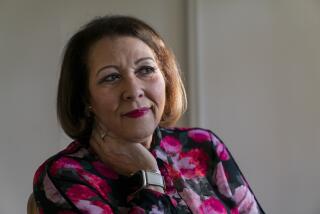New view of mammograms
Everyone who knows the prevailing medical wisdom on hormone replacement therapy for menopausal women, please stand up.
Feels lonely up there, doesn’t it?
Hormone therapy after menopause was standard practice after a 1991 study found that it reduced the risk of cardiovascular disease -- until a study 11 years later found the opposite. Since then, the treatment has been linked to other health problems -- and found to have some advantages as well. Some doctors highly recommend hormones; others warn their patients away from them.
Here we go again. After years of dutifully showing up for their annual mammograms, women in their 40s were advised this week by a federal panel on preventive health not to bother with the routine screenings. Those in their 50s were told to get one only every other year. Monthly manual breast self-examination -- that’s out altogether. This comes two years after the American Cancer Society reported that deaths from breast cancer had been falling 2% a year since 1990, a drop it attributed to widespread screening. Doctors have taken vocal sides for and against the new recommendations; the cancer society denounced it; and U.S. Health and Human Services Secretary Kathleen Sebelius told women to keep getting screened. Confusion reigns, not helped by the bland advice given on this and every other contentious medical issue: “Consult your personal physician.”
The recommendations by the U.S. Preventive Services Task Force shouldn’t be discarded outright by a medical establishment that has grown accustomed to viewing mammograms as a major lifesaver. The task force was right to bring questions about routine screening into public debate. Studies conflict on mammography’s value, but the most recent figures -- which were used by the panel -- indicate that for women in their 40s with no risk factors for the disease, the procedure saves one life per 2,000 or so women while giving false positive results for up to 8% of patients, some of whom will undergo biopsies and possibly unnecessary treatments that carry their own risks. Contrary to earlier thinking about cancer -- that all of it spreads and kills if untreated -- some cancers never present a real health risk, and mammograms are less effective at finding the more aggressive ones.
As much as we would like to believe that every life is worth endless amounts of money, there are limits on resources for healthcare. It makes sense to locate those resources where they do the most good.
But by so emphatically dismissing routine mammograms for women in their 40s, the panel may have caused unnecessary harm. There aren’t enough high-quality studies of the issue. New technologies are being developed for more sensitive mammography; women might be discouraged from getting the tests just as they become more effective. The task force report also placed undue emphasis on the anxiety created by false positives, as though women were fragile flowers who can’t handle distress. And its findings on self-examination were faulted even by Dr. Laura Esserman, the UC San Francisco breast oncologist who wrote a paper in the Oct. 21 issue of the Journal of the American Medical Assn. that questioned the value of mammograms. Half of breast cancers are found by the patients, she said, and women should be familiar enough with breast exams to detect changes.
Just about everyone knows a hard-to-ignore anecdote about a life saved by mammography. And many fortysomething women would gladly undergo the discomfort of mammograms, plus any anxiety or unnecessary biopsies, to be among those saved by early detection. But if the panel’s findings lead insurance companies to eventually restrict coverage, these women might not be able to afford the health screenings they and their doctors believe are worthwhile.
Breast cancer is expected to kill 40,000 women in the United States this year. We agree with experts who say better screening methods are needed, but until those come along, these recommendations have confused medical decision-making rather than guided it. Besides, much of the public will simply wait for yet another set of studies to find the opposite.






